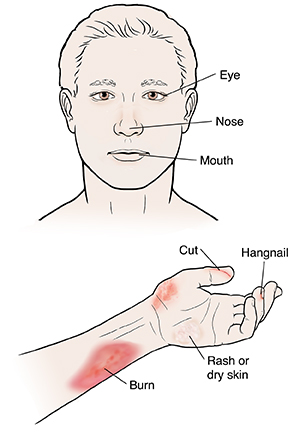Understanding Bloodborne Pathogens
Understanding Bloodborne Pathogens

Hepatitis B virus (HBV)
-
Hepatitis B can cause severe damage to the liver. It can even lead to death.
-
A vaccine is available to help prevent hepatitis B infection. This vaccine is given as 3 shots over a period of time.
-
Adults who aren't vaccinated and are exposed at work to another person's blood or body fluids can be given medicine or a vaccine after the exposure. This helps prevent infection from developing.
Hepatitis C virus (HCV)
-
Like hepatitis B, hepatitis C can cause severe damage to the liver. It can lead to death.
-
There is no known vaccine for HCV.
Human immunodeficiency virus (HIV)
-
HIV makes it harder for the body to fight infection. HIV causes acquired immune deficiency syndrome (AIDS). This is a serious illness that can lead to death.
-
There is no known vaccine for HIV.
Bloodborne diseases can infect you when:
-
You help an injured person without using a protective barrier between you and the infected person's blood or body fluids.
-
An object or surface with infected blood or body fluids on it touches your broken skin.
-
Contaminated body fluids on your unwashed hands come in contact with your eyes, nose, or mouth.
-
You are pricked or scratched by a sharp object (such as broken glass or a needle) that has infected blood or body fluids on it.
Updated:
January 23, 2020
Sources:
Management of Healthcar Personnel Exposted to HIV, Up To Date, Management of Healthcare Workers Exposed to Hepatitis B Virus or Hepatitis C Virus, Up To Date
Reviewed By:
Horowitz, Diane, MD,Image reviewed by StayWell medical illustration team.